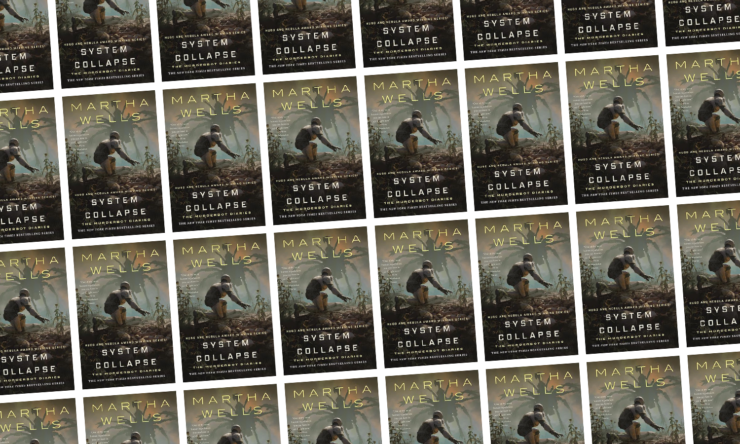We’re thrilled to share an excerpt from The Book of Ile-Rien by Martha Wells, a revised and updated edition of both The Element of Fire and The Death of the Necromancer. This new omnibus collecting the author’s preferred texts is forthcoming from Tordotcom Publishing on February 27! Please enjoy the first chapter of The Element of Fire along with an introduction by the author, and check back on February 22 for an additional excerpt from book two.
The kingdom of Ile-Rien lies in peril, menaced by sorcerous threats and devious intrigue, when Kade, bastard sister of King Roland, appears unexpectedly at court. The illegitimate daughter of the old king and the Queen of Air and Darkness herself, Kade’s true desires are cloaked in mystery.
It falls to Thomas Boniface, Captain of the Queen’s Guard, to keep the kingdom from harm. But is one man’s steel enough to counter all the magic of fayre?
A Note From Martha Wells
The Element of Fire was my first novel, written around 1989-1990, a few years after I graduated from college. When I was writing it I had no idea if it would be published or not, or even if I’d actually be capable of writing a whole novel, I just had a lot of hope. I’d wanted to be a writer for a long time, since I was a teenager, but had had no luck selling short stories to magazines. Amazingly, it was published in 1993 by Tor Books. I revised this new edition in 2022.
For me revisiting past work is an often painful experience. Thirty-four years ago I was a different person, a different writer. I’ve tried to keep the feel of the original while bringing it up to a standard I’m happy with today.
The Element of Fire
Chapter One
The grappling hook skittered across the rain-slick stone of the ledge before dropping to catch in the grillwork below the third-story window. Berham leaned back on the rope to test it. “That’s it, Captain Sir. Tight as may be,” the servant whispered.
“Well done,” Thomas Boniface told him. He stepped back from the wall and looked down the alley. “Now where in hell is Dr. Braun?”
“He’s coming,” Gideon Townsend, Thomas’s lieutenant, said as he made his way toward them out of the heavy shadows. Reaching them, he glanced up at the full moon, stark white against the backdrop of wind-driven rain clouds, and muttered, “Not the best night for this work.” The three men stood in the muddy alley, the dark brocades and soft wools of their doublets and breeches blending into the grimy stones and shadow, moonlight catching only the pale lace at the wrists or shirt collars of Thomas and his lieutenant, the glint of an earring, or the cold metal sheen on rapiers and wheellock pistol barrels. It was a cool night and they were surrounded by failed counting houses and the crumbling elegance of the decaying once-wealthy homes of the River Quarter.
Thomas personally couldn’t think of a good time to forcibly invade a foreign sorcerer’s house. “The point of it is to go and be killed where you’re told,” he said. “Is everyone in position?”
“Martin and Castero are up on the tannery roof, watching the street and the other alley. I put Gaspard and two others at the back of the house and left the servants to watch the horses. The rest are across the street, waiting for the signal,” Gideon answered, his blue eyes deceptively guileless. “We’re all quite ready to go and be killed where we’re told.”
“Good,” Thomas said. He knew Gideon was still young enough to see this as a challenge, to care nothing for the political reality that sent them on a mission as deadly as this with so little support. Glancing down the alley again, he saw Dr. Braun was finally coming, creeping along the wall and uncomfortably holding his velvet-trimmed scholar’s robes out of the stinking mud. “Well?” Thomas asked as the sorcerer came within earshot. “What have you done?”
“I’ve countered the wards on the doors and windows, but the inside… This person Grandier is either very strong or very subtle. I can’t divine what protections he’s used.” The young sorcerer looked up at him, his watery eyes blinking fitfully. His long sandy hair and drooping mustache made him look like a sad-faced spaniel.
“You can’t give us any hint of what we’re to find in there?” Thomas said, thinking, This would have been better done if I hadn’t been saddled with a sorcerer who has obviously escaped from a market-day farce.
Braun’s expression was both distressed and obstinate. “He is too strong, or… he might have the help of some creature of the Fay.”
“God protect us,” Berham muttered, and uneasily studied the cloudy darkness above. The others ignored him. Berham was short, rotund, and had been wounded three times manning barricades in the last Bisran War. He claimed that the only reason he had left the army was that servants’ wages were better. Despite the little man’s vocal posturing, Thomas was not worried about his courage.
“What are you saying?” Gideon asked Dr. Braum. “You mean we could fall down dead or burst into flame the moment we cross the threshold?”
“The uninitiated so often have ill-conceived ideas about these matters, like the fools who believe sorcerers change their shapes or fly like the Fay. It would be exceedingly dangerous to create heat or cold out of nothing—”
“Yes, but—”
“That’s enough,” Thomas interrupted. He took the rope and tested it again with his own weight. The first floor of the house would be given over to stables, storage for coaches or wagons, and servants’ quarters. The second would hold salons and other rooms for entertaining guests, and the third and fourth would be the owner’s private quarters. That would be where the sorcerer would keep his laboratory, and very likely his prisoner. Thomas only hoped the information from the King’s Watch was correct and that the Bisran bastard Grandier wasn’t here. He told Gideon, “You follow me. Unless, of course, you’d like to go first?”
His lieutenant swept off his feathered hat and bowed extravagantly. “Oh, not at all, Sir, after you.”
“So kind, Sir.” The brickwork was rough and Thomas found footholds easily. He reached the window and pulled himself up on the rusted grating, balancing cautiously. He felt the rope jerk and tighten as Gideon started to climb.
The window was set with small panes of leaded glass and divided into four tall panels. Thomas drew a thin dagger from the sheath in his boot and slipped the point between the wooden frames of the lower half. Working the dagger gently, he eased the inside catch up. The panels opened inward with only a faint creak. Moonlight touched the polished surface of a table set directly in front of the window, but the darkness of the deeper interior of the room was impenetrable. It was silent, but it was a peculiar waiting silence that he disliked.
Then the window ledge cracked loudly under his boots and he took a hasty step forward onto the table, thinking, Now we’ll know, at any rate. Dust rose from the heavy draperies as he brushed against them, but the room remained quiet.
“Was that wise?” Gideon asked softly from below the windowsill.
“Possibly not. Don’t come up yet.” Thomas slipped the dagger back into his boot sheath and drew his rapier. If something came at him out of that darkness, he preferred to keep it at as great a distance as possible. “Tell Berham to hand up a light.”
There was some soft cursing below as a dark lantern, its front covered by a metal slide to keep the light dimmed, was lit and passed upward. Thomas waited impatiently, feeling the darkness press in on him like a solid wall. He would have preferred the presence of another sorcerer besides Braun, the rest of the Queen’s Guard, and a conscripted city troop to quell any possibility of riot when the restive River Quarter neighborhood discovered it had a violent foreign sorcerer in its midst. But orders were orders, and if the Queen’s guards or their captain were killed while entering Grandier’s house secretly, then at least civil unrest was prevented. An inspired intrigue, Thomas had to admit, even if he was the one it was meant to eliminate.
Buy the Book


The Book of Ile-Rien
As he reached down to take the shuttered lamp from Gideon, something moved in the corner of his eye. Thomas dropped the lamp onto the table and studied the darkness, trying to decide if the hesitant motion was actually there or in his imagination.
The flicker of light escaping from the edges of the lamp’s iron cover touched the room with moving shadows. With the toe of his boot Thomas knocked the lantern slide up.
The wan candlelight was reflected from a dozen points around the unoccupied room, from lacquered cabinets, the gilt leather of a chair, the metallic threads in brocaded satin hangings.
Then the wooden cherub supporting the right-hand corner of the table Thomas stood on turned its head.
He took an involuntary step backward.
“Captain, what is it?” Gideon’s whisper was harsh.
Thomas didn’t answer. He looked around the room as the faces in the floral carving over the chimneypiece shifted their blank white eyes, their tiny mouths working silently. The bronze snake twined around the supporting pole of a candlestand stirred sluggishly. In the woolen carpet the interwoven pattern of vines writhed.
Keeping hold of the rope, Gideon chinned himself on the window ledge to see in. He cursed softly.
“Worse than I thought,” Thomas agreed, not looking away from the hideously animate room. Unblinking eyes of marbleized wood stared sightlessly, limbs and mouths moved without sound. Can they see? Or hear? he wondered grimly. Most likely they can. He doubted they were here only to frighten intruders, however effective they might be at it.
“We should burn this house to the ground,” Gideon whispered.
“We want to get Dubell out alive, not scrape his ashes out of the wreckage.”
“How?”
Good question, Thomas thought. The vines in the carpet were lifting themselves above the surface of the floor like the tentacles of a sea beast. They were as thick around as a man’s wrist and looked strong, and metallic glints that had been gilt threads in the weaving were growing into knife-edged thorns. It was only going to get more difficult. Thomas caught up the lantern and stepped down into a chair with arms shaped into gilded lampreys. They struggled viciously but were unable to turn their heads back far enough to reach him. From there he stepped down to the hardwood floor and backed toward the doorway.
Gideon made a move to climb into the window but the viselike tentacles were reaching up above waist-height and groping along the edge of the table. Thomas said, “No, stay back.”
At the sound of his voice the vines whipped around and stretched out for him, growing prodigiously longer in a sudden bound. Thomas threw himself at the door.
The latch was weak and snapped as his weight struck it. He stumbled through and caught himself, just as something thudded into the dark paneled wall in front of him. He dropped the lantern and dove sideways, scrambling for cover between two brocaded chairs and the fireplace.
Embedded in the wall, still quivering, was a short metal arrow; if he had come through the doorway cautiously it would have struck his chest. The lion heads on the iron firedogs snapped ineffectually at him as he pushed himself farther behind the chairs, thinking, Where the hell is he? The sputtering candle sent shadows chasing across crowded furniture and everything moved. Then in the far corner he saw the life-sized statue of an archer. Naked to the waist and balancing a candleholder on his head, he was drawing a second arrow out of the bronze quiver at his side and putting it to his short bow.
Rolling onto his back to make himself a smaller target, Thomas dropped the rapier and drew one of his wheellocks. He’d loaded both pistols down in the alley, and now as he wound up the mainspring, an arrow thudded into the overstuffed chair seat. The other chair began to edge sideways using the clawed feet at the ends of its splayed legs; without thinking Thomas muttered, “Stop that.” He set the spring, braced the pistol on his forearm, and fired.
The plaster statue shattered in the deafening impact. The shot scarred the wall behind it and filled the room with the stink of gunpowder.
Thomas got to his feet, tucked away the empty pistol, and picked up his rapier. Now the whole damned house knows I’m here. He hadn’t planned to do this alone either, but the vines filling up the first room and curling round the doorway into this one committed him to it.
Avoiding the animate furniture, he went to the door in the opposite wall and tried the handle. It was unlocked, and he eased it open carefully. The room within was dark, but the archway beyond revealed a chamber lit by a dozen or so red glass candelabra.
Thomas pulled the door closed behind him and moved forward. The dim light revealed stealthy movement in the carvings on the fireplace mantel and along the bordered paneling. In the more brightly lit chamber beyond the arch, he could see an open door looking out onto the main stairwell.
He stopped just before the fall of light from the next room would have revealed his presence. There was something… Then he heard the creak of leather and a harsh rasp of breath. It came from just beyond his range of sight, past the left side of the arch. They knew Grandier had hired men to guard the house; it was the only way the King’s Watch had been able to trace the sorcerer, since there was no one in the city who could identify him. The man in the next room must have heard the shot; possibly he was waiting for the protective spells to dispose of any intruders. Thomas had planned on something to distract the sorcerer’s human watchdogs, to send them down to the lower part of the house, if Gideon would just get on with it…
From somewhere below there was a muffled thump, and the floorboards trembled under his feet. Thomas smiled to himself; shouts and running footsteps sounded from the stairs as the hired swords hastened for the front door. In theory, he wasn’t disobeying the King’s orders to keep the raid on Grandier’s house secret. Placed correctly, a small charge of gunpowder could blow a wooden door to pieces while making little noise, and the houses to either side of Grandier’s were empty anyway.
The waiting guard did not take the bait with the others, but went forward to stand at the doorway into the stairwell, his rapier drawn. He was big, with greasy blond hair tied back from his face, and dressed in a dun-colored doublet. Thomas had already decided to kill him and had started forward when the man turned and saw him.
The hired sword’s shout was muffled by the clatter of his comrades on the stairs and he rushed forward without waiting for help. Thomas parried two wild blows, then beat his opponent’s sword aside and lunged for the kill. The man jerked away and took the point between the ribs instead of under the breastbone, dropping his weapon and staggering back. Cursing his own sloppiness, Thomas leapt after him, grappling with him and trying to drive his main gauche up under the man’s chin. In another moment Thomas eased the limp body to the floor. Blood pooled on the rug and on his boots, but hopefully the others were occupied below and there was no one left to follow his trail.
He glanced quickly around the room and noted it was free of the sorcerous animation. There was a closed door on the opposite wall, and it bore examining before he ventured out onto the main stairs.
As Thomas was reaching for the handle, he felt a sharp stab of unease. He stepped back, his hand tightening on his sword-hilt, baffled by his own reaction. It was only a door, as the others had been. He reached out slowly and felt his heart pound faster with anxiety as his hand neared the knob.
Either I’ve lost my senses, he thought, or this door is warded. Testing it with his own reactions, he found the ward began about a foot from the door and stretched out to completely cover the surface. It was a warning, with a relatively mild effect, more than likely meant to keep the hired swords and servants away from this portion of the house. It could also explain why the dead man hadn’t left his post to investigate the pistol shot or to follow his comrades to the front entrance. He had been guarding something of crucial importance.
Thomas stepped back and kicked the center panel, sending the door crashing open. Beyond was a staircase leading upward, softly lit by candlelight glowing down from the floor above.
Bracing himself, Thomas stepped through the ward and onto the first step, and had to steady himself against the wall as the effect faded. He shook his head and started up the stairs.
The banister was carved with roses that swayed under a sorcerous breeze only they could sense. Thomas climbed slowly, looking for the next trap. When he stopped at the first landing, he could see that the top of the stairs opened into a long gallery, lit by dozens of candles in mirror-backed sconces. Red draperies framed mythological paintings and classical landscapes. At the far end was a door, guarded on either side by a man-sized statuary niche. One niche held an angel with flowing locks, wings, and a beatific smile. The other niche was empty.
Thomas climbed almost to the head of the stairs, looking up at the archway that formed the entrance to the room. Something suspiciously like plaster dust drifted down from the carved bunting.
A tactical error, Thomas thought. Whatever perched up there wasn’t decorative. He took a quiet step back down the stairs, drawing his empty pistol. The air felt warm; beneath his doublet, sweat was sticking the thin fabric of his shirt to his ribs. From the powder flask on his belt he measured out a double charge and poured it into the barrel. He pushed the bullet and wadding down with the short ramrod, thinking that it would be quite ironic if the pistol exploded and ended the matter here.
Thomas wound and set the spring, carefully aimed the pistol at the top of the archway, and fired. The fifty-caliber ball tore through the light ornamental wood and into the body of the plaster statue that clung to the molding above the arch. Thomas shielded his face as splintered wood and fragments of plaster rained down. A sculpted head, arm, and pieces of a foot thudded to the floor.
He climbed the last few steps and stopped at the front of the gallery, which was now wreathed in the heavy white smoke of the pistol’s discharge. This next trap wasn’t bothering to conceal itself.
Ponderously the angel statue turned its head toward him and stepped out of its niche in the far wall. Thomas shoved the empty pistol back into his sash and drew the second loaded one, circling away from the angel. It was slow, its feet striking the polished floor heavily, plaster wings flapping stiffly.
It stalked him like a stiff cat as he backed away. He wanted to save the pistol for whatever was behind the next door, so he was reluctant to fire.
Then his boot knocked against something that seized his ankle. He fell heavily and dropped the wheellock. It spun across the polished floor and somehow managed not to go off. Rolling over, he saw that the hand and arm of the broken statue had tripped him and was still holding onto his ankle. He drew his main gauche and smashed at it with the hilt. The hand shattered and fell away, but the angel was almost on top of him.
With a desperate scramble backward, he caught the base of a tall bronze candlestand and pulled it down. The heavy holder in the top struck the statue in the temple and knocked loose a chunk of plaster. It reared back and Thomas got to his feet, keeping hold of the candlestand. As it lurched toward him again he swung the stand. A large piece of the wing cracked and fell away as the blow connected. The creature staggered, suddenly unbalanced.
Past the stumbling statue he saw movement on the stairs. There were dark writhing shapes climbing the steps, dragging themselves upward on the banisters. He backed away, realizing it was the vines that had sprung out of the carpet in the first room. Are they filling the entire house? The situation was horrible enough, it hardly needed that. And he had known he couldn’t get out the way he had gotten in, but he had hoped to have the front door as an option. Now that way was blocked. Thomas dropped the candlestand and turned to the other door.
He pulled it open and one quick glance told him the room seemed unoccupied by statues. He slammed the door closed as the angel lumbered awkwardly toward him, and braced against it as he shoved the bolt home. He stepped back as the thing battered against the other side.
Moonlight from high undraped windows revealed shelf-lined walls stacked with leatherbound books, most chained to the shelves. It was a large room, crowded with the paraphernalia of both library and alchemical laboratory, quiet except for the erratic tick of several lantern docks. There was a writing desk untidily crammed with paper, and workbenches cluttered with flasks and long-necked bottles of colored glass. It smelled of tallow from cheap candles, the musty odor of books, and an acrid scent from residue left in the containers or staining floors and tabletops. He drew his rapier again and moved around the overladen tables, inherent caution making him avoid the stained patches left by alchemical accidents on the floor. He knew he would have to come back to this house at some point: the desks and cabinets crammed with scribbled papers would undoubtedly hold some of Grandier’s secrets, but now he hadn’t time to sort the vital information from the trash.
Thomas circled the rotting bulk of a printing press and a cabinet overflowing with ink-stained type, and stopped. At the far end of the room, hidden by stacked furniture and shadows, was a man seated in a plain chair. He faced the wall and seemed to be lost in thought. Dressed in a black cope and a baggy scholar’s cap, his face was angular and lean in profile and his hair and beard were gray. He didn’t seem to be breathing.
Then Thomas saw the shimmer of reflected moonlight from the window and realized the man was encased in an immense glass ball. Wondering at it, he took a step forward. The enigmatic figure didn’t move. He went closer and lifted a hand to touch the glass prison, but thought better of it.
As if the gesture was somehow perceptible to the man inside, he turned his head slowly toward Thomas. For a moment his expression was vacant, eyes fixed on nothing. Then the blue eyes focused and the mouth smiled, and he said, “Captain Thomas Boniface. We haven’t formally met, but I have heard of you.”
Thomas had not known Galen Dubell closely, the fifteen years ago when the old sorcerer had been at court, but he had seen the portraits. “Dr. Dubell, I presume.” Thomas circled the glass prison. “I hope you have some idea of how I’m to get you out of there.”
There was another heavy crash against the door. The statue, the animate vines, or something else was battering its way in.
“The power in this bauble is directed inward, toward me. You should be able to break it from the outside,” Dubell said, his composure undisturbed by the pounding from the door.
It would be dangerous for the old sorcerer but Thomas couldn’t see any other way. At least the heavy wool of his scholar’s robe would provide some protection. “Cover your head.”
Using the hilt of his rapier, Thomas struck the glass sphere. Lines of white fire radiated out along the cracks. The material was considerably stronger than it looked, and cracked like eggshell rather than glass. He hit it twice more, then it started to shatter. A few of the larger shards broke loose, but none fell near the old man.
Galen Dubell stood carefully and shook the smaller fragments out of his robes. “That is a welcome relief, Captain.” He looked exhausted and bedraggled as he stepped free of his prison, glass crackling under his boots.
Thomas had already sheathed his rapier and was overturning one of the cabinets beneath the window. He stepped atop it and twisted the window’s catch. Cool night air entered the stuffy room as he pushed it open. An ornamental sill just below formed a narrow slanted ledge. Leaning out, he could see the edge of the roof above. They would have to climb the rough brickwork.
He pulled his head back in and said, “I’m afraid we’ll have to take the footpad’s way out, Doctor.” He just hoped the old man could make it, and speedily; the battering at the door was growing louder.
Dubell scrambled up the cabinet easily enough. As if he’d read Thomas’s thought, he said, “It’s quite all right, Captain. I prefer the risk to more of Urbain Grandier’s hospitality.” He might have the easier time of it; he was almost a head taller than Thomas.
As Dubell pulled himself carefully out onto the narrow sill, the door gave way.
The sorcerer used the scrollwork around the window casement as a ladder, drawing himself up toward the roof. Thomas swung out onto the sill after him and stood, holding onto the window frame. Broken fragments of brick sprinkled down as Dubell grasped the edge of the roof above.
Thomas boosted him from below and Dubell scrambled over the edge. Digging fingertips into the soft stone, Thomas started to pull himself upward. Dubell had barely been able to grasp the ledge from here; Thomas knew he would have to stand on top of the cornice before he could reach safety.
There was a crash just inside. Straining to reach the edge of the roof, Thomas bit his lip as something gave way beneath his left boot. Fingers wedged between the soft brick, he groped for another hold and felt the mortar under his hand crumble.
From above, Galen Dubell caught his arm in an iron grip and supported him as he found another foothold. For a man who must do little with his hands besides write or do scholarly experiments, Dubell was surprisingly strong. The man’s gentle demeanor made it easy to think of him as nothing more than an aged university don and to forget that he was also a wizard.
Thomas scrambled over the edge, his muscles trembling with the strain. “I thank you, Doctor,” he said, sitting up, “but there are those at court who won’t appreciate it.”
“I won’t tell them about it, then.” Breathless with exertion, Dubell looked around, the damp breeze tearing at his gray hair and his cap. “Are those your companions?”
There was a shout. The two men he had stationed atop the tannery were waving from the edge of the next roof.
“Stay there!” Thomas shouted back. “We’ll come to you.”
Slowly they made their way up the crest of the pitched roof to the edge where the others were throwing down some planks to bridge the gap. The slate tiles were cracked and broken, slipping under their feet. They had just crossed the makeshift bridge to the tannery when Thomas turned to say something to Dubell; in the next instant he was lying flat on the rough planks with the others as the timber frame of the building was shaken by a muffled explosion. Then they all retreated hastily across the tannery roof, choking on acrid smoke, as flames rose from the Bisran sorcerer’s house.
* * *
“So much for keeping this quiet,” Thomas remarked to Gideon. The two men sat their nervous horses, watching from a few lengths down the street as Grandier’s house burned. There was a crash as the façade collapsed inward, sending up a fireworks display of sparks and an intense wave of heat. The neighborhood had turned out to throw buckets of water and mud on the surrounding roofs and mill about in confusion and panicked excitement. The real fear had subsided when the residents realized the fire was confining itself to the sorcerer’s home, and that only a few stray sparks had lit on the surrounding structures.
Three of the hired swords had been taken alive, though Thomas doubted they would know much, if anything, about Grandier’s intentions. His own men had obeyed their orders and come no farther than the front hall, so they had been able to escape the fire. There had been one casualty.
Gaspard, one of the men who had been posted in the court behind the house, had been hit by a splintered piece of flaming wood as he tried to escape from the explosion. His back and shoulder had been badly burned and he had only escaped worse by rolling in the muddy street. Dubell had insisted on treating the injury immediately, and Thomas was only too glad to permit it. Now Gaspard sat on a stone bench in the shelter of a hostler’s stall, his shirt and doublet cut away so Dubell could treat the blistering wound. Berham was handing the sorcerer supplies from Dr. Braun’s medical box and Dr. Braun himself was hovering at Dubell’s elbow. Thomas suspected that Berham was providing more practical assistance than Braun.
“The fire is hardly our fault.”
Gideon shrugged. “Blame Grandier for it.”
“Yes, he’s a cunning bastard.”
Gideon glanced at him, frowning. “How do you mean?”
Thomas didn’t answer. Dubell had finished tying the bandage and Martin helped Gaspard stand. As Castero led their horses forward, Thomas nudged his mare close enough to be heard over the shouting and the roar of the fire. “Gaspard, I want you to ride with Martin.”
“Sir, I do not need to be carried.” The younger man’s face was flushed and sickly.
“That was not a request, Sir.” Thomas was in no mood for a debate. “You can ride behind him or you can hang head down over his saddlebow; the choice is yours.”
Gaspard looked less combative as he contemplated that thought, and let an exasperated Martin pull him unresisting to the horses.
Berham was packing the medical box under Braun’s direction while Dubell stared at the fire. Thomas had been considering the question of why Grandier had not killed Galen Dubell. The answer could simply be that Grandier might have wanted to extract information from the old scholar, and his plan had gone awry when the King’s Watch located the house. But somehow he didn’t think it was going to be simple. The fire should have started when I broke the glass ball. Yes, it served the purpose of destroying Grandier’s papers, but why not kill all the birds with one stone? Unless he wanted us to rescue Dubell. But why? To announce his presence? To show them how powerful and frightening he was? To make them distrust Dubell?
As Berham took the medical box away to pack on his horse, Thomas waved Dr. Braun over and leaned down to ask him, “Is it possible for Grandier to… tamper with another sorcerer, to put a geas on him?”
Braun looked shocked. “A geas can be laid on an untrained mind, yes, but not on a sorcerer like Dr. Dubell.”
“Are you very sure about that?”
“Of course.” After a moment, under Thomas’s close scrutiny, Braun coughed and said, “Well, I am quite sure. I had to put gasçoign powder in my eyes to see the wards around the house, and a geas, or any kind of spell, would be visible on Dr. Dubell.”
“Very well.” That was as good as they were going to get without taking the old scholar to Lodun to be examined by the sorcerer-philosophers there, and there was no time for that.
Dubell came toward them. “An unfortunate fire,” he said wearily. “There was much to learn there.”
“I thought you said it was dangerous to create fire out of nothing?” Thomas asked Braun, exercising a little of his frustration on the most annoying target.
“It is,” Braun protested, flustered.
Dubell smiled. “It depends on one’s appreciation of danger.”
“So much does,” Thomas agreed. “They’ll have some questions for you at the palace.”
“Of course. I only hope my small knowledge can aid you.”
“We’ll find Grandier,” Gideon said, coming up beside them.
Dubell’s eyes were troubled. “If he continues his mischief on such a grand scale, he will be hard to miss. He’ll also be a fool, of course, but he may not see it that way.”
“Oh, I hardly think he’s a fool,” Thomas said. Castero and Berham had gotten Gaspard mounted up behind Martin, and they began to turn their horses away from the crowded street. As the others went down the alley, Thomas took one last look at the burning house. So far Grandier had shown an odd combination of ruthlessness and restraint, and he was not sure which he found more daunting. The sorcerer had snatched Galen Dubell out of his home in Lodun, indiscriminately slaughtering the servants who had witnessed it. For no practical reason, since Lodun University was full of wizards and scholars of magic who had been able to divine Grandier’s identity within hours of examining the scene. Yet the fire that could have been so devastating stuck to Grandier’s house like pitch and refused to spread to the ready tinder of the other old buildings. As much as he might wish to, Thomas couldn’t see it as a gesture of defiance. He only wondered where, in what corner of the crowded city, the word had passed to watch for a sorcerous blaze in the night, and what to do then.
Excerpted from The Element of Fire, copyright © 2024 by Martha Wells.














